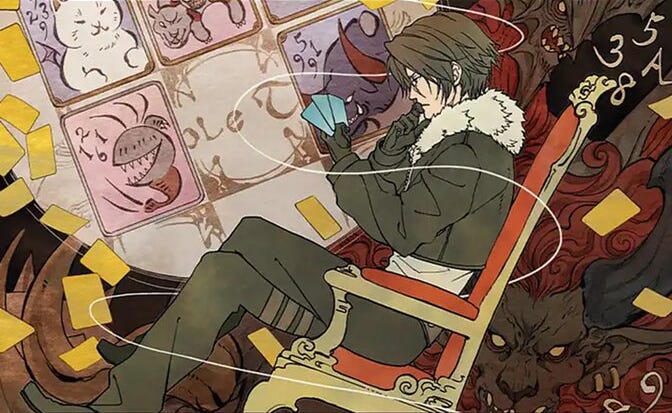Welcome to the Kupo Chronicle, the premium edition of the Wark Digest newsletter, where we explore the Final Fantasy universe in long-form and drill down into unique moments of the series’ history. I’m Chris, aka Hoogathy, and in this installment we ask, “wanna play cards?”
This week’s newsletter is 2791 words, a 13-minute read.
All eyes are on the Magic: The Gathering crossover with Final Fantasy this week, a massive collaboration between two pioneering games in their own spaces. While it might be easy to write this off as another shameless corporate cash-grab, there’s actually more history between the games than you might think, and card games are also deeply rooted in Final Fantasy’s culture.
Let’s take a deep-dive into the series’ history of shuffling and boogieing, and the long-term impact of Triple Triad.
From Mini To Macro
Minigames as a whole date back to the original game, where legendary programmer Nasir Gebelli snuck a sliding “15 Puzzle” into the code, but it wasn’t until Final Fantasy VI and VII that they rose to more prominence. FFVI had a tactical mode, where you must control different parties to block enemies from reaching a destination, and also the gut-wrenching fishing scenario on the Solitary Island.
FFVII, meanwhile, made a meal out of minigames. They ranged from set pieces (sneaking past the guards in Shinra HQ, the parade in Junon, snowboarding) to full-fledged distractions, especially at the Gold Saucer. Paramount of them all was the Chocobo Breeding questline, which tied many elements of the game around the racing minigame played earlier on disc one.
Chocobo husbandry became a key part of FFVII’s legend, largely thanks to its grand prize, the Knights of the Round summon. And now a bar or precedent had been set: how do you build upon this plethora of minigames? In theory, fans might be expecting this trend to continue, and might be disappointed if the next game didn’t offer something comparable. Minigames were essentially part of the FF DNA now—but more on this later.
And yet, the team wasn’t necessarily too fussed about living up to their own performance:
“I didn’t really feel like [FFVII] had been such a wildly successful game,” Kitase told Game Informer in 2019. “It just felt like more people the world over had a chance to play it—not just in Japan. So there wasn’t any pressure to make Final Fantasy VIII as successful or anything specifically like that, but there was definitely a sense of wanting to make a game that would be appealing to people around the world.”
Keep reading with a 7-day free trial
Subscribe to Wark Digest from Final Fantasy Union to keep reading this post and get 7 days of free access to the full post archives.




